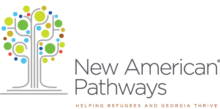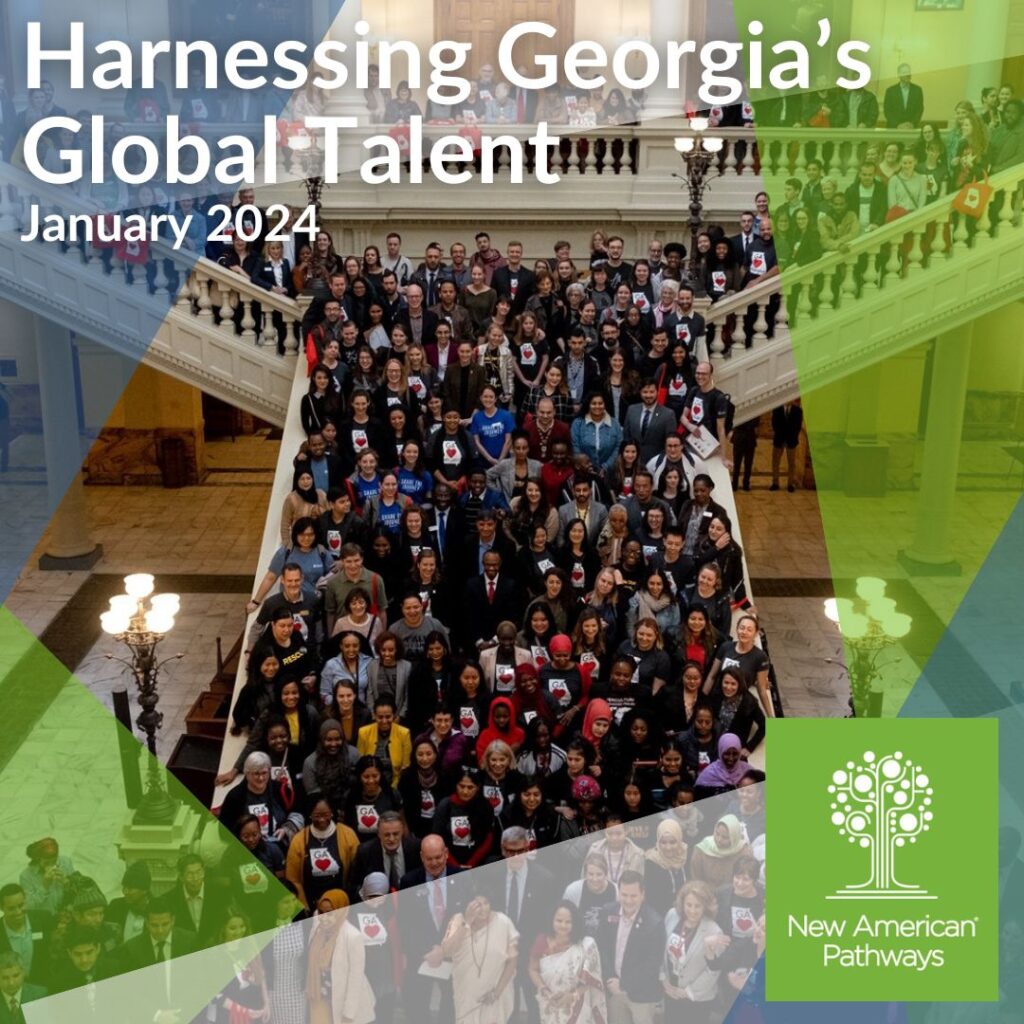By Susan Mittleman
Look around Georgia and you’ll notice our population has changed tremendously in the past decade. We look different, sound different, eat different. We are more diverse. Today, one in ten Georgians is foreign born. In just this past year, New American Pathways has welcomed more than 1,500 new immigrants to the state. That includes Refugees,[1] people with Special Immigrant Visas, (SIV)[2] and other Entrants,[3] also known as Humanitarian Parolees.
But it’s not enough to just welcome people to Georgia. We need to keep them here. Employ them. Educate them. Teach them language skills. Our state has a worker shortage – but no shortage of global talent. Unfortunately, several of our state laws and policies are obsolete, prohibitive or don’t allow for many of our new arrivals to find pathways to work in their chosen professions, afford post-secondary or continuing education, or even develop language skills to succeed. This “brain waste” needs to change before we drive our talented newcomers elsewhere. What New AP and its Coalition of Refugee Serving Agencies (CRSA) partners are advocating for in 2024 is to “harness Georgia’s global talent”. Rather than see doctors, dentists, mental health workers, trades people, college bound young people and others, move out of state, we want to reform our policies and guidelines to make it easier to live, work, and receive an education here. Not to just re-settle, but to re-home our immigrant families and help refugees, immigrants and Georgia thrive.
Part of the problem is that not all immigrant visas are the same. ‘Refugees,’ ’SIV’s,’ and ‘Parolees or Entrants’ do not have the same status or receive the same benefits upon arrival. Some folks can get green cards, others cannot. Some can get in-state tuition, others cannot. Some can get Medicaid and food stamps, others cannot or are restricted.
The roadblocks are plentiful. Some professionals are forced to literally start all over, no matter their experience. Childcare is hard to find. Driver’s license rules keep changing. There is not one set of regulations nor one central location to go to find out what rules to follow. There can be a disconnect between interpretations of federal and state policies, which can lead to delays and fees. Employers don’t always know the latest guidelines, and one of the biggest roadblocks? ESL. “Everything is connected to language,” says Shaista Amani, Program Manager for the Afghan American Alliance of Georgia. “No matter how many skills you have, no matter how hard working you are, no matter if you have three master’s degrees, in order to do a job here, the first thing you need is language.”
The good news is that policy makers are starting to listen. “We went from no discussion, to lawmakers coming to Clarkson and listening to refugees and immigrants directly,” says Darlene Lynch, Chair of the CRSA Policy Commission and Co-Founder and Chair of The BIG (Business & Immigration for Georgia) Partnership. “Now they’re testifying and people are learning their stories. It may seem small but it’s quite a huge step for Georgia.”
The Georgia General Assembly begins its 2024 session with recommendations from a recent House Committee Report on how to maximize global talent. Formal recommendations include:
- Removing unintended barriers to admission at Georgia public colleges
- Streamlining requirements for experienced professionals
- Investing in English language programs
- Expanding access to childcare and entrepreneurship
“Everything starts with baby steps,” says Lynch. “Last year was a milestone year. We introduced more bipartisan legislation for immigration and refugees in Georgia than ever before, including three different in-state tuition bills for this new legislative session and one bill that would start the process of streamlining licensing for mental health care professions.”
These baby steps can lead to positive change, as the Georgia Board of Regents just distributed new guidelines to all schools in the University System, clarifying that Afghan and Ukrainian humanitarian parolee students are eligible for in-state tuition benefits or out-of-state tuition waivers, depending on their date of arrival.
New American Pathways CEO, Paedia Mixon, says there has been a lot of positive change. Instead of advocating against bad policy, “Now we’re fortunate to be advocating for good policies.” The DeKalb County Commission recently championed funding to establish its Welcoming DeKalb Office to support immigrants and refugees. Along those lines, Mixon hopes to see a state-wide Office for New Americans or the ‘Georgia Office for Global Talent’ in the not too distant future. “Our job is to welcome people to Georgia, so we want to make sure it’s a good place to be welcomed to.”
Georgia has been welcoming refugees and immigrants for some 40 years. As we start 2024, let’s not just welcome them, let’s keep them here and enable them to thrive.
What can you do to help “harness global talent”?
* Volunteer. Teach English. Mentor families. Help guide them through language barriers on resumes, drivers’ tests, applying for a job. (https://newamericanpathways.org/get-involved/)
* Call or email your elected officials. Be on the lookout for specific bills. The Georgia Assembly’s new session begins January 9th.
* Attend the New American Celebration on February 13th at the Capitol. Stay tuned for more information.
[1] Refugee= A person forced to flee their country because of violence or persecution. They have often spent more than a decade in refugee camps waiting to come here.
[2] SIV= Special Immigrant Visa. These are usually people from Iraq and Afghanistan who helped the U.S. military.
[3]Humanitarian Parolee or Entrant= Generally people from Ukraine, Afghanistan, Cuba, Haiti who’ve arrived in the past two years under duress and don’t have time to apply for refugee status.
Susan Mittleman is a communications specialist, writer, producer, yoga teacher and a member of New American Pathways’ Advisory Council.

